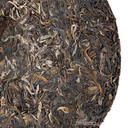Tea: Fengqing Paddy Flavor Raw Pu-erh Cake Tea 2006
A Raw (Sheng) Pu-erh from TeaVivre
| Brand: | TeaVivre |
| Style: | Raw (Sheng) Pu-erh |
| Region: | Fengqing, Yunnan, China |
| Caffeine: | Caffeinated |
| Loose? | Compressed |
| # Ratings: | 2 View All |
| Product page: | Fengqing Paddy Flavor Raw Pu-erh Cake Tea 2006 |
Reviewer: homais

✓ 21 teas reviewed
✓ 1 of Raw (Sheng) Pu-erh
✓ 1 of Pu-erh Tea
✓ 6 of TeaVivre
✓ 1 from Fengqing, Yunnan, China
✓ 4 from Yunnan, China
Review of Fengqing Paddy Flavor Raw Pu-erh Cake Tea 2006
February 14th, 2013
| Aroma | Flavor | Value | Total |
| 8 of 10 | 4 of 5 | 3 of 5 | 80 of 100 |
| Excellent | Good | Reasonable |
I don't have a lot of experience with higher-end Pu Erh tea, so I don't have much to compare this to. In the past I've drank (and rather liked) the cheap stuff you find in Chinatown, the kind that smells fishy and tastes of dirt.
This tea was an altogether different experience for me. I didn't have much of it, so I followed the brewing instructions, which have much shorter steep times than I'm used to with the lower-end teas.
This is a complex beverage. The aroma is smoky, but not quote in the way lapsang teas are smoky. More like the smell of tea-smoked fish or tofu.There are floral notes as well, but very little of the wet earth smell I had expected.
I steeped this one many times, and as you'd expect for a tea this complex, it was a little different each time. Early on it was smooth and a bit peaty, with a taste that was floral, but more like marigold-floral than, say, red honeysuckle-floral. There was also a bit of earthiness - again, not very damp. Just earthy and a bit like leaves and hay - that served as counterpoint to the floral taste. It wasn't an aftertaste, though the earthiness always hit my tongue a fraction of a second after the floral taste, which is why I describe it as counterpoint. Throughout, there was also a pleasant, numbing, warming effect on my tongue, which inspired me to drink it more slowly than I usually do. Otherwise the numbness would have overpowered my ability to taste the tea.
With subsequent steepings, the floral taste faded and the earthy taste became more prominent, becoming a refreshingly bitter, warming brew that produced a mildly euphoric and energized state in me. It also, in fact, seemed to settle my stomach, which pu erh teas are known for doing. This may have been a placebo, but I don't care.
Again, I don't have much to compare this one to, but insofar as it's interesting, complex, makes you feel good, and doesn't have much of that tastes-like-dirt character that turns a lot of people off of this style of tea, I imagine it would be accessible for a lot of people, including someone who's just starting to learn about pu erhs.


